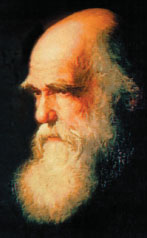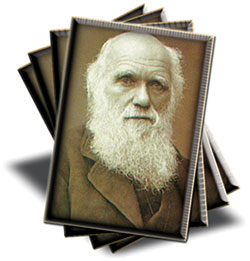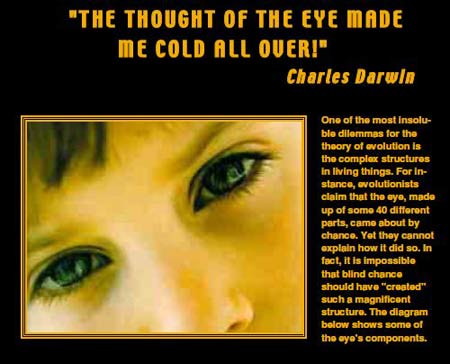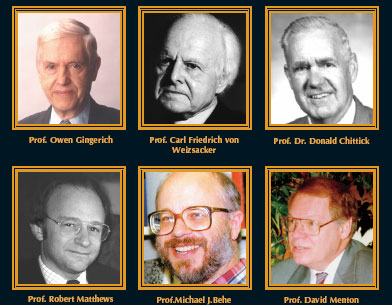Throughout history, people have thought about the universe and the origin of life, and have put forward various ideas on the subject. We can divide these into two groups: those who try to explain the universe from a materialist point of view, and those who see that Allah made the universe out of nothing, namely, the truth of creation.
 |
| Charles Darwin |
In the introduction, we saw that the theory of evolution was constructed upon materialist philosophy. The materialist view claims that the universe consists of matter and that matter is the only thing that exists. According to this fallacious belief, matter has existed for all time and no other power rules over it. Materialists believe that blind coincidence caused the universe to shape itself and life to come about by gradually evolving from non-living substances. In other words, all living things in the world emerged as the result of natural influences and coincidence.
Materialist philosophy uses the theory of evolution, both of which complement each other, to account for the emergence of life. The theory of evolution and materialist philosophy are two thought systems that complement one anotherthe primitive scientific conditions of the nineteenth century and, since the theory allegedly backed up materialism, whether or not it had any scientific validity, it was adopted immediately by materialists.
The fact of creation stands in opposition to the theory of evolution. And as scientific findings make clear, matter has not existed for all time and therefore is controlled. Allah created matter out of. All things, living as well as non-living, came into being by Allah's creation. The amazing equilibrium and order seen in the universe and in living things are clear evidence of this.
Religion has taught the truth of creation, which all people can grasp through reason and personal observation, since the beginning of time. All divine religions have taught that Allah created the universe by commanding "Be!" and that its flawless functioning is proof of His great power of creation. Many Qur'anic verses also reveal this truth. For example, Allah reveals how He miraculously created the universe from nothing: "The Originator of the heavens and Earth. When He decides on something, He just says to it, 'Be!' and it is" (Surat al-Baqara, 117). It is also revealed as follows:
 |
He created the heavens and Earth with truth. The day He says "Be!" it is. His speech is Truth. The Kingdom will be His on the Day the Trumpet is blown, the Knower of the Unseen and the Visible. He is the All-Wise, the All-Aware. (Surat al-An'am, 73)
Modern science demonstrates the invalidity of the materialist-evolutionist claim and confirms the fact of creation. Contrary to the claims of the theory of evolution, all the proofs of creation that surround us show that chance had no role in the universe's coming into existence. Every detail that emerges as we observe the sky, Earth, and all living things is intended as evidence of Allah's great power and wisdom.
This fundamental difference between religion and atheism is that the former believes in Allah, while the latter believes in materialism. When Allah asks those who deny, He draws attention to the claims that they assert in order to reject creation: "Or were they created out of nothing, or are they the creators?" (Surat at-Tur, 35).
Ever since the dawn of time, those who deny creation have uttered the falsehood that humanity and the universe were not created and have sought to justify this irrational and illogical claim in their own eyes. Their greatest support came in the nineteenth century, thanks to Darwin's theory.
There is no question of Muslims to seek a compromise on this issue. Of course people can think as they please and can believe in whatever theories they wish. However, there can be no compromise with a theory that denies Allah and His creation, for this would involve compromising on religion's fundamental element. This is a completely hollow endeavor.
Evolutionists, aware of how such a compromise, in their own eyes, would damage religion, encourage religious people to try and find such a compromise.
Scientists who blindly support the theory of evolution are being backed further into a corner by new scientific advances that are becoming more frequent and better known to the public. Given that every new discovery works against the theory and attests to the fact of creation. Therefore, demagogy takes pride of place over scientific evidence in evolutionist literature. On the other hand, even the most prominent evolutionist scientific magazines, like Science, Nature, Scientific American or New Scientist are forced to admit that several aspects of Darwin's theory have reached a dead end. Scientists who defend creation win these scientific debates, thereby exposing the evolutionists' baseless claims.
If they come upon you, they will be your enemies and stretch out their hands and tongues against you with evil intent, and they would dearly love you to disbelieve. (Surat al- Mumtahana, 2)
At this point, the view of creation by evolution, which is another deception, comes to the materialists' aid. This is one of the tactics used by the evolutionists to get the support of the faithful and to weaken their intellectual struggle against the theory of evolution. Although evolutionists do not believe in Allah, for they have made a deity out of chance (Allah is beyond that) and totally oppose the fact of creation, they think that their theory will become more acceptable if they remain silent about some people's idea that Allah created living things through evolution. However, this is only a tactic. Evolutionists are against religion and the fact of creation. In fact, they encourage a compromise between the theory and religion so that evolution will become more acceptable and belief in creation will weaken.
Given this, Muslims must understand that it is totally mistaken to believe that Allah created the universe and yet support the theory of evolution despite the lack of hard scientific evidence. Furthermore, it is just as mistaken to claim that evolution is compatible with the Qur'an by ignoring all the warnings in the Qur'an itself. Believers, who adopt such a position, must realize that they are supporting an idea designed to help materialist philosophy and that, given this fact, they must withdraw their support at once.
 |
The number of Muslims who believe in the fallacy that all living things emerged by means of evolution should not be underestimated. Their error is based upon a lack of knowledge and mistaken viewpoints, particularly in regard to scientific matters. Heading the list is the idea that evolution is a scientific and proven fact.
Such people do not realize that science has completely eroded the theory of evolution's credibility. Whether on the molecular level or in biology and paleontology, research has invalidated the claims that living things emerged as the result of an evolutionary process. The theory of evolution continues to survive, despite all scientific facts, only because the evolutionists are doing all they can, including deliberately misleading people, to keep it alive. Their writings and speeches are filled with scientific terms that the average person cannot understand. Yet when their words are analyzed, one can find no evidence to support their theory.
A careful examination of Darwinist publications reveals this fact quite clearly. Their accounts are almost never based upon firm scientific proof. The fundamental areas where the theory collapses are glossed over in a few words, and many fantastic scenarios are written about natural history. They never dwell on such essential questions as how life first emerged from inanimate substances, the fossil record's huge gaps, and the complex systems in living things. They do not do so because whatever they might say or write would contradict their aims and reveal the emptiness of their theory.
 |
When Charles Darwin (1809-82), the founder of this theory, considered one of the complex systems in living things, in this case the eye, he realized the danger that this posed to his theory and even admitted that thinking about the eye made him cold all over. Like Darwin, today's evolutionist scientists know that their theory has no answer for such complex systems. But instead of admitting this, they seek to overcome the lack of scientific evidence by writing imaginary scenarios and imposing the theory on people by giving it a scientific mask.
Such methods become obvious during face-to-face debates between evolutionists and those who believe in the fact of creation, as well as in evolutionist writings and documentaries. Actually, evolutionists are not bothered by such things as scientific truth or reason, for their sole goal is to make people believe that evolution is a scientific fact. In this way, Muslims who have been deceived by evolution are influenced by the theory's supposed "scientific" image. They are particularly alarmed by such Darwinist slogans as: "Anyone who does not believe in the theory of evolution is being dogmatic or unscientific," and so give ground on their true beliefs. Influenced by outdated information or evolutionist writings and arguments, they believe that only evolution can account for the emergence of life. They then try to reconcile religion and evolution, for they are unaware of the latest scientific developments as well as the theory's own internal contradictions and complete loss of credibility.
However, given that evolution and creation are diametrically opposed, proving one means disproving the other. In other words, disproving evolution means proving creation.
Muslims who defend evolution must be aware of this. Darwinism is not a scientific thesis; rather, it is a system of thought designed to lead people to deny Allah. As this theory has no scientific foundation, Muslims must not allow themselves to be misled by its arguments and thereby give it any support, no matter how well-intentioned.
 |
 |
| Prof. Arda Denkel |
The evolutionists' most important deception to gain widespread acceptance for Darwin's theory is to assert that the theory is widely accepted within the scientific community. In short, they are claiming validity for their theory based upon the supposed majority of its adherents and the supposed correctness of the majority's view in all cases. By employing such logic, as well as their claim that evolution's truth is further proven by its wide acceptance within the universities, they attempt to use psychological pressure on people, including believers in Allah, to accept it.
Arda Denkel, a former evolutionist professor of philosophy, now deceased, at Bosphorus University, probably the most prestigious university in Turkey, even admitted the erroneous nature of this method:
Does the fact that many respected people or organizations or bodies believe in it prove the theory of evolution to be true? Could the theory be proved by a court verdict? Does the fact that respected and powerful people believe in something make it true? I would like to recall a historical fact. Did not Galileo stand up before all the respected people, lawyers, and particularly scientists of his time and speak the truth on his own, with no support from anyone? Did not the courts of the Inquisition reveal other, similar situations? Gaining the support of respected and influential circles neither creates the truth nor has anything to do with scientific fact.1
As Denkel noted, wide acceptance of a theory does not prove its truth. In fact, the history of science is full of examples of theories that were first accepted by a minority and then only later came to be accepted as true by the majority.
 |
| Many contemporary scientists reject evolution and accept that Allah, the Lord of Infinite Intelligence and Might, created the universe. Some of the scientists who accept the truth of creation are, from left to right, Owen Gingerich, professor of astronomy and history of science at Harvard University; Carl Friedrich von Weizsacker, professor of physics at Germany's Max-Planck-Gesellschaft University; Donald Chittick, professor of chemistry at Oregon State University; Robert Matthews, professor of physics at Oxford University; Michael J. Behe, professor of biology at Lehigh University; David Menton, professor of anatomy at Washington University; S. Jocelyn Bell Burnell, professor of physics at the Open University in England; and William Dembski, associate professor in the conceptual foundations of science at Baylor University. |
Moreover, evolution is not accepted by the entire scientific community, as its proponents would have people believe. Over the last 20-30 years, the number of scientists rejecting the theory of evolution has risen enormously. Most of them abandon their dogmatic belief in Darwinism after seeing the perfection in the universe and living things. They have published countless works demonstrating the theory's invalidity. Even more important, they are members of prominent universities all over the world, especially in the United States and Europe, and experts and career academics in biology, biochemistry, microbiology, anatomy, paleontology, and other scientific fields.2 Therefore it would be very wrong to say that the majority of the scientific community believes in evolution.
It would thus have no meaning, even if evolutionists are genuinely in the majority. No majority view is definitely right just because it is the majority view. This truth must also be acknowledged by Muslims who believe in evolution. As it is revealed in the Qur'an, many communities of deniers in the past claimed to be in the majority in order to be able to deny Allah and His deen and sought to turn people away from the true path . Allah warns believers against following such deceitful people, and informs humanity that going along with the majority can lead to terrible mistakes:
If you obeyed most of those on Earth, they would guide you away from Allah's Way. They follow nothing but conjecture. They are only guessing. (Surat al-An'am, 116)
He Who created the seven heavens in layers. you will not find any flaw in the creation of the All-Merciful. Look again – do you see any gaps? Then look again and again. Your sight will return to you dazzled and exhausted! (Surat al-Mulk, 3-4)
1. Arda Denkel, Cumhuriyet Bilim Teknik Eki (Cumhuriyet Science and Technology Supplement), February 27, 1999, p.15 (Emphasis added)
2. Some of the most prominent contemporary critics of Darwinism are Michael Behe (biochemist), Michael Denton (biochemist), Jonathan Wells (biologist), William Dembski (mathematician), Charles Taxton (biochemist), and Dean Kenyon (molecular biologist). Many other scientists arguing against Darwinism can be reached through institutions like The Discovery Institute, The Intelligent Design Network, or The Institution for Creation Research.(For further details, see Harun Yahya's The Qur'an Leads the Way to Science, Nickleodeon Books, Singapore, 2002)